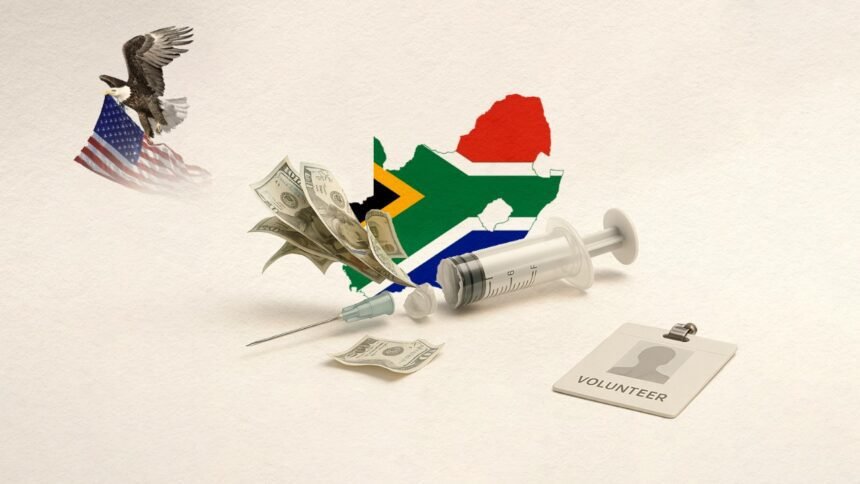In a quiet laboratory on the outskirts of Cape Town, where years of research once promised a future without HIV, silence now hangs like a sterile fog. Once buzzing with scientists, volunteers, and hope, the doors of South Africa’s leading HIV vaccine trials have been shuttered. The culprit isn’t a new virus or a failed compound—it’s politics. Specifically, a sudden withdrawal of U.S. funding that has pulled the plug on one of the world’s most ambitious efforts to combat HIV.
South Africa, home to the largest HIV-positive population in the world—some 7.8 million people—has long been at the forefront of research and treatment innovation. For years, local institutions partnered with global organizations, most notably the U.S. President’s Emergency Plan for AIDS Relief (PEPFAR) and the National Institutes of Health (NIH), to pioneer trials for an effective HIV vaccine. These trials, spread across Johannesburg, Cape Town, and Durban, not only pushed the boundaries of medical science but provided employment for hundreds of health professionals and lifelines for thousands of volunteers.
All that changed when a wave of funding cuts—initiated under the Trump administration and not fully reversed since—hit the system like a blunt scalpel. Dozens of research centers were suddenly starved of grants. Projects that had been years in the making came to an abrupt halt. Staff were laid off, patient follow-ups terminated, and the world’s most vulnerable cohort of HIV patients once again left to fend for themselves.
“The entire infrastructure we built—gone overnight,” said Dr. Nandipha Mkhize, a leading epidemiologist and principal investigator at one of the now-defunct trial sites. “This isn’t just about science. It’s about trust. It’s about communities that believed in something finally collapsing under political pressure.”
Indeed, the optics are painful. South Africa, which once symbolized global solidarity in the fight against HIV/AIDS, now finds itself abandoned. Experts warn that the collapse of the vaccine trial network could set back global efforts by at least a decade. “This was ground zero for vaccine science,” said Dr. Harold Goodman, a virologist affiliated with the WHO. “If you wanted to know whether a candidate worked in a high-prevalence, high-risk population, you went to South Africa.”
What makes the situation especially bitter is that progress had been made. While a fully effective vaccine remained elusive, researchers were narrowing in on new approaches involving mRNA platforms, antibody-guided prevention, and novel adjuvants—many of which were showing promise. One trial in KwaZulu-Natal had recently passed phase two benchmarks with statistically significant immune responses. The next step, a large-scale efficacy trial, was slated to begin in early 2025. Instead, lab equipment is being packed up, data sits in limbo, and researchers are looking for jobs.
The Biden administration has voiced regret but stopped short of promising a reversal. Budget constraints, shifting global priorities, and what one U.S. official described as “donor fatigue” have complicated the reinstatement of large-scale HIV research aid. Ironically, just as the COVID-19 pandemic showed the world what vaccine development could achieve with enough funding and urgency, the fight against HIV is being left to limp along in its shadow.
For South African health workers and activists, the consequences are already being felt. Clinics that once offered trial-linked support services—transport, food vouchers, and regular health screenings—now sit empty. Volunteers who risked social stigma and personal inconvenience to join trials are now left without follow-ups or even answers. “We were told we were part of history,” said a 28-year-old woman from Umlazi who asked to remain anonymous. “Now we’re not even worth a phone call.”
The broader implications are equally grim. South Africa’s public health system, already strained by TB, COVID-19 aftershocks, and budget shortfalls, now has to absorb the unmet needs left behind by the trial collapse. This includes high-risk populations—sex workers, men who have sex with men, and intravenous drug users—who relied heavily on the integrated services provided by vaccine research centers.
Meanwhile, civil society organizations are mobilizing. The Treatment Action Campaign (TAC) and Section27 have launched a joint campaign urging the South African government to step in where Washington has stepped back. They are calling for a “sovereign research strategy” that reduces dependency on foreign donors, paired with legislative reforms that incentivize domestic pharmaceutical investment. Whether such ambitions are financially viable in the current economic climate remains uncertain.
Still, not all is lost. Some smaller trials supported by European partners and the Gates Foundation continue to operate in limited capacities. And the South African Medical Research Council has pledged to maintain core research infrastructure “to the extent possible.” But few believe that patchwork efforts can replace the scale and ambition of the now-defunct programs.
At a moment when global solidarity is fraying and donor attention is increasingly fickle, South Africa’s vaccine research tragedy serves as a stark reminder of the fragility of scientific progress when tethered to political whims. For now, the dream of an HIV vaccine is on pause—not because the science failed, but because the funding did.
And in a world where pandemics don’t wait for budgets, that may be the most dangerous experiment of all.










